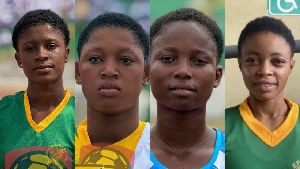Accra, May 21, GNA - Mrs. Akua Dua Agyeman, an official from the United Nations Development Programme (UNDP) on Wednesday said malnutrition remained a challenge in Ghana, especially in famine-prone areas and this had contributed to about half of child mortality rate. She said, however, various nutrition indicators showed that Ghana could potentially achieve target two of the Millennium Development Goals (MDGs) of reducing by half, the number of people suffering extreme hunger by 2015.
"More needs to be done if Ghana is to achieve a net primary ratio of 100 per cent by 2015," she said.
Mrs. Agyeman was presenting a paper on the "General Overview on the MDGs, and the Ghanaian Experience" at the official opening of the International Youth Summit, which has coincided with the launch of the Africa Global Sister Cities Foundation (AGSCF), the African Chapter of Sister Cities International.
Representatives from Malawi, Nigeria, South Africa, Zimbabwe, Morocco, Cote d'Ivoire, Senegal and Swaziland are attending the one-week international conference under the theme; "Strengthening Sister Cities Partnership in Africa Through Peace and Citizen Diplomacy in Meeting the Millennium Development Goals for Change".
Mrs. Agyeman said Ghana would neither achieve the goal of reducing under-five mortality rate by two-thirds nor achieve the goal of reducing maternal mortality rate by three-quarters by 2015 unless efforts were intensified.
The Sister Cities Programme inherently involves a unique kind of partnership and involvement of the three main sectors of a vibrant, productive community local government and business and private voluntary sectors.
Touching on poverty reduction, Mrs. Agyeman said there were strong indications that Ghana would reduce the proportion of the population below the upper poverty line to between 14 and 21 per cent by 2015, assuming per capita growth rates between two and four per cent. She said from all indications Ghana was likely to reduce poverty further than the 26 per cent target set.
According to her, Ghana as at 2006 had achieved 28.5 per cent against the 26 per cent targeted for by 2015.
The gender equality target was not achieved by the set date of 2005. However, she said, the target could be achieved by the end of 2008 and 2009 if the current efforts of promoting girl-child education continued.
Equality of access for boys and girls to Junior High Secondary School could be achieved but not before 2008/2009, she added.
Prince Kwame Kludjeson, President-Chair, Africa Global Sister Cities, said the summit was one of the maiden civil society initiatives at bringing young people from across the continent together to re-look at their roles in achieving the MDGs.
"There is no better a time or opportunity than now for you as young leaders, especially Africans, to converge and brainstorm on the issues that affect not only your present situation but your common future.
"In the entire world, the youth face similar challenges but of varying dimensions and degrees. However, in Africa, the similarities of these variations are too coherent to be treated lightly," he said. He said the challenges of poverty, illiteracy, unemployment, disease especially HIV/AIDS and climate change demanded urgent attention and prompt action and that the clarion call for action could only be spearheaded successfully by the youth who formed the energetic and productive segment of the African population.
Mr Kludjeson said the AGSCF had a firm belief in the ability of the youth to create meaningful change in their immediate communities, nations and the world at large.
He announced that the foundation had created the Youth and Education Unit to provide the necessary tools, resources and opportunities for the total empowerment of young people in Africa by promoting City-to-City and People-to-People partnerships. "Through this unit, we envisage young African leaders like you to rediscover your talents, exploit your potentials and showcase your abilities in whatever way possible," he added. In a speech read for her, the Chief Justice Georgina Wood, reiterated the need for policies to empower women to deliberate on giving visibility and support to women's contribution and addressing the differential impact of strategies, policies, programmes and projects on women's inclusion.
She noted that women's empowerment was not merely a desirable by-product of development but a core goal in its own right. "Any form of gender discrimination is a denial of human rights and an obstacle to human development," she added.
Mr Sherman Banks, Immediate past President, Sister Cities International, stressed the need to consider how to reach out to the youth in their local communities, schools and other social activities, encourage them to become involved in international activities, build global youth successes and how to create employment for them. "We are dealing with intense and complex issues, but sometimes a simple conclusion emerges. We need a metamorphosis in our thinking," he said.
General News of Wednesday, 21 May 2008
Source: GNA












